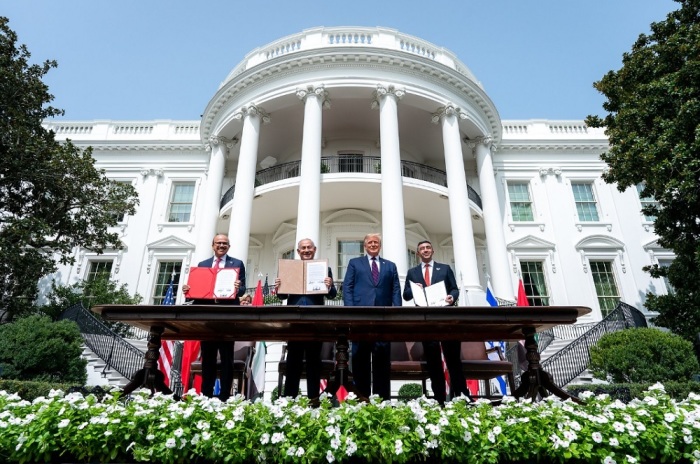Evangelicals praise White House signing of 'Abraham Accords' between Israel, UAE and Bahrain

Many evangelical leaders have praised the signing of the historic “Abraham Accords” between Israel, the United Arab Emirates and Bahrain at the White House on Tuesday, marking the third and fourth Arab nations stating intentions to establish full diplomatic relations with Israel.
The signing ceremony on the South Lawn formalized announcements made previously indicating intent by the two country’s to normalize relations with Israel.
The agreement signed between Israel and UAE, first announced last month, is described by the White House as "a treaty of peace, diplomatic relations, and full normalization.”
Meanwhile, the agreement between Israel and Bahrain to establish full diplomatic relations is only described as a declaration of intent to make peace since the agreement between the countries was announced last week and not enough time has elapsed to create a formal agreement.
A third document signed by leaders of the U.S., Israel, Bahrain and UAE is titled the “Abraham Accords,” a reference to Abraham, the patriarch of Judaism, Christianity and Islam.
The agreements mark the first time in two decades that Israel has entered into a peace agreement with another Middle Eastern country, with the last being Jordan in 1994.
President Donald Trump said following the signing that the agreements “mark the dawn of a new Middle East” amid “decades of division and conflict.” He said the signing “sets history on a new course” and vowed there will be “other countries very, very soon that will follow these great leaders."
"Together these agreements will serve as the foundation for a comprehensive peace across the entire region, something which nobody thought was possible, certainly not in this day and age," Trump said.
In a Facebook post, Franklin Graham, the head of the Billy Graham Evangelistic Association and son of the late evangelist Billy Graham, called the signing “historic.”
“Peace in the Middle East impacts the entire world, and I commend President Trump, his son-in-law Jared Kushner, and others who have worked so hard toward this resolution,” Graham wrote. “Even though much remains to be done, this is a start.”
Among those who attended the signing ceremony at the White House was Johnnie Moore, an evangelical communications executive and commissioner on the U.S. Commission on International Religious Freedom.
“An era of peace & prosperity where hope & opportunity are in full bloom,” Moore, who has supported the Trump presidency and acted as an informal spokesperson for the evangelical pastors who have engaged with the administration, wrote in a tweet.
California evangelist and megachurch Pastor Greg Laurie voiced his support for the “historic moment in world history.” In a tweet, he congratulated Trump and Secretary of State Mike Pompeo for brokering the deal.
Another attendee of the White House ceremony was Mat Staver, chairman of the conservative Christian legal nonprofit Liberty Counsel.
“We are grateful for President Trump’s wise foreign policy strategy that makes today a historic breakthrough for peace between Israel and its neighbors,” Staver stressed in a statement. “When he took office, the Middle East had been in a state of extreme turmoil for years. Now more Arab and Muslim countries will likely seek to normalize relations with Israel which will bring peace and prosperity to the region and the people who live there.
On the White House lawn, Trump told reporters that as many as nine more countries could be joining in normalizing relations with Israel.
“We’ll have, I think, I mean I think seven, or eight, or nine,” Trump said. “We’re going to have a lot of other countries joining us, including the big ones.”
Kushner, the president’s son-in-law and senior adviser, said last month that there “is an inevitability” that Saudi Arabia and Israel will eventually fully normalized relations.
Yael Eckstein, president of the International Fellowship of Christians and Jews, referred to the agreements as a “miracle.”
“Sometimes in history, God blesses his people with miracles, from the parting of the Red Sea to the reestablishment of the modern state of Israel. Today is also a miracle — a miracle of peace,” she said in a statement. “It’s been over two decades since the nation of Israel last entered into a peace agreement with another Middle Eastern country. Israel has often extended its hand for peace. Now that hand has been grasped twice in 29 days thanks to courageous leaders willing to take risks in order to realize a lasting peace.”
After the deal between the UAE and Israel that would see the suspension of Israel’s plans to annex parts of the West Bank was initially announced last month, Democratic presidential nominee Joe Biden, the former vice president under Barack Obama, praised the agreement but insisted it was a result of efforts of multiple administrations, including the Obama-Biden administration.
Joel Rosenburg, an evangelical author and dual Israel-U.S. citizen who has been involved in meetings with Arab leaders in recent years, said in a recent interview that the UAE “felt betrayed” by the Obama administration’s decision to negotiate an agreement with Iran “secretly.”
“Trump’s willingness to tear up that Iran agreement and ... put intense new economic sanctions on Iran … that showed all the Arab world that this president is different and that he is a deal maker,” Rosenberg said. “That sort of began a process of thinking maybe this is the moment.”
“I think the final pivot point was, honestly, Prime Minister Netanyahu’s push toward annexation over the summer,” Rosenberg added. “That rattled the United Arab Emirates because behind the scenes they were ready to make peace with Israel. To their credit, they intensified the clarity of their offer using the president of the United States and Secretary Pompeo, Jared Kushner to make it clear to Netanyahu that this isn’t just talking, this is a real option: peace or annexation.”




























